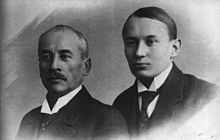Aarre Merikanto
[1] He was born in Helsinki, Grand Duchy of Finland, the son of Elise "Liisa" Häyrynen (1869–1949) and the famous romantic composer, professor Oskar Merikanto (1868–1924).
[2] He is considered a key figure in early Finnish modernism (together with Väinö Raitio and Ernest Pingoud) and several of his works, most notably the opera Juha, have obtained posthumous attention.
[3] As professor of composition in the Sibelius Academy (1951–1958) Merikanto taught several Finnish composers of the next generation, including Einojuhani Rautavaara, Usko Meriläinen, Aulis Sallinen and Paavo Heininen.
The reception of Merikanto's works of this period was mixed: the "Schott" Concerto for nine instruments was awarded in a competition organized by the German publishers Schott & Söhne, but his domestic Finnish audiences and critics were generally unenthusiastic and his opera Juha, today considered one of his major works, was never performed during Merikanto's lifetime.
Disappointed with the reactions, starting in the early 1930s, Merikanto gradually abandoned his more radical style and turned towards a more traditional idiom based on Neoclassicism.
